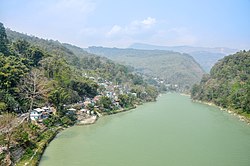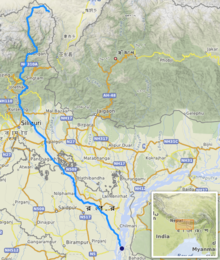| Teesta River Trisrotā | |
|---|---|
 Teesta in Siliguri, West Bengal | |
 Path of the Teesta | |
| Location | |
| Country | |
| States | |
| Important Bridges |
|
| District's | |
| Towns & Cities | |
| Physical characteristics | |
| Source | Pauhunri, Zemu Glacier, Gurudongmar Lake, Tso Lhamo Lake |
| • location | Sikkim, India |
| • elevation | 7,128 m (23,386 ft)[1] |
| Mouth | Brahmaputra River |
• location | Phulchhari Upazila, Gaibandha, Bangladesh |
| Length | 414 km (257 mi)[1] |
| Basin size | 12,540 km2 (4,840 sq mi)[2] |
| Basin features | |
| Tributaries | |
| • left |
|
| • right |
|
Teesta River is a 414 km (257 mi) long river that rises in the Pauhunri Mountain of eastern Himalayas, flows through the Indian states of Sikkim and West Bengal and subsequently enters Bangladesh through Rangpur division. In Bangladesh, it merges with Brahmaputra River which after meeting some other major rivers of the Bengal delta finally falls into the Bay of Bengal.[1] It drains an area of 12,540 km2 (4,840 sq mi).[2] In India, the Teesta flows through Mangan District, Gangtok District, Pakyong District, Kalimpong district, Darjeeling District, Jalpaiguri District, Cooch Behar districts and the cities of Rangpo, Jalpaiguri and Mekhliganj. In Bangladesh, it flows through Lalmonirhat District, Rangpur District, Kurigram District and Gaibandha District. It joins the Brahmaputra River at Phulchhari Upazila in Bangladesh. 305 km (190 mi) of the river lies in India and 109 km (68 mi) in Bangladesh. The Teesta is the largest river of Sikkim and second largest river of West Bengal after the Ganges.
- ^ a b c Mullick, M. R. A.; Babel, M. S. & Perret, S. R. (2011). "Discharge‐based economic valuation of irrigation water: Evidence from the Teesta River, Bangladesh". Irrigation and Drainage. 60 (4): 481−492. doi:10.1002/ird.597.
- ^ a b Rahaman, M. M. & Mamun, A. A. (2020). "Hydropower development along Teesta river basin: opportunities for cooperation". Water Policy. 22 (4): 641–657. doi:10.2166/wp.2020.136.

